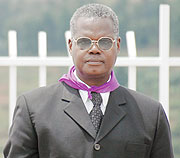KIGALI - Organisations representing survivors of the 1994 Genocide yesterday contested speculations that the International Criminal Tribunal for Rwanda (ICTR) could send genocide archives to Kenya.


KIGALI - Organisations representing survivors of the 1994 Genocide yesterday contested speculations that the International Criminal Tribunal for Rwanda (ICTR) could send genocide archives to Kenya.
The archives include large records, testimonies and tens of thousands of hours of video-taped court proceedings that have been amassed over the last 15 years of its operations
Theodore Simburudari, president of Ibuka, an umbrella organization of Genocide survivors’ said this would be a wrong decision following all the solid reasons that Rwanda has given to have the archives transferred and kept here.
"Ibuka wrote to the ICTR explaining why it is important for us to have our archives transferred here.
The genocide crimes were done here and committed against Rwandans so it only right that we own all the evidence of what happened here.”
The ICTR is faced with a deadline of up to the end of next year to have wound up all activities and the archives must get a destination before it closes down.
"We can only be able to teach the next generations about the reality of what happened and how it damaged the nation using those very archives.
Besides, why should survivors seek justice from other countries when we have the capability of handling these issues here?” Simburudari questioned with anger.
The Executive Secretary of the National Commission for the Fight against Genocide (CNLG), Jean de Dieu Mucyo also rejected this plan citing that it is not right at all.
"It is not in anyway logical to take evidence of the crimes committed against Rwandans to Kenya. Those who committed these atrocities are also Rwandans so that decision would not be right at all,” Mucyo emphasized.
Meanwhile Assumpta Umurungi, the Executive Secretary of Avega, the umbrella association of genocide widows, expressed hope that the decision to take these documents to any other country other than Rwanda will be reversed.
"As a legacy we must keep this information. It is a memory of what happened to our loved ones and my hopes are high that they will bring the archives here,” Umurungi underscored.
Benoit Kaboyi, the Executive Secretary of Ibuka condemned this move citing that Rwanda is a part of the International Community hence the decision to take away these records will imply that there is another story than what meets the eye.
"If at all they are taken to Kenya, then this could mean that there is a hidden agenda as to why ICTR would not want us to have our documentation.
They think that we do not have security, peace and information and communication technology which we do.”
"We have the necessary ability to handle our matters therefore there is no logic as to why our property should be taken elsewhere,” a furious Kaboyi added.
With only about sixteen months to the closure of the Tanzanian-based court, the Security Council ordered that the remaining trials be taken to national jurisdictions.
Once transferred to Rwanda, experts say the archives would play several roles including facilitating future prosecutions; serving as a historic record, as well as contributing to the country’s peace and reconciliation process.
Ends


